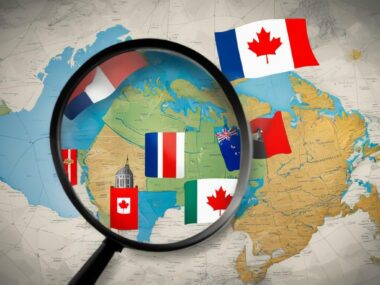Are you looking to immigrate to Canada for a better life in under one year? Look no further! This comprehensive guide will walk you through the process and help you achieve your goal.
Key Takeaways:
- Canada offers various immigration pathways to make the process more manageable
- Explore immigration programs like the Express Entry Program for quicker permanent residency
- Be financially, mentally, and socially prepared for the transition to Canada
- Understand important aspects of settling in Canada, such as property, banking, healthcare, and taxes
- Consider the cost of living, visa-free duration for US citizens, and extreme weather
- Alternative ways to move to Canada include family reunification and studying
- Ensure admissibility and settle successfully in Canada after the immigration process
Factual data: Immigrating to Canada for a better life in under one year is a popular choice for many individuals. Canada offers various immigration pathways to make the process more manageable. The first step is to determine if you need a visa, although US citizens are exempt from this requirement for up to six months. Then, you can explore different immigration programs, such as the Express Entry Program, which is the quickest way to obtain permanent residency. Other programs include the Federal Skilled Worker Program, Federal Skilled Trades Program, Provincial Nominee Program, Quebec Selected Skilled Workers, Atlantic Immigration Program, Self-Employment Visa, and Start-Up Visa. Once you have chosen the appropriate pathway, you can apply for the permit online or in person and prepare for the move. It is essential to be financially, mentally, and socially prepared for the transition. Important things to know when moving to Canada include renting/buying property, opening a bank account, understanding the healthcare system, and being aware of tax obligations. The average cost to settle in Canada is CAD 13,200, and US citizens can stay in Canada visa-free for six months. Dual citizenship is permitted, and Canada offers great benefits such as job opportunities and low crime rates, but it also has a high cost of living and extreme cold weather. Other ways to move to Canada include family reunification and study purposes, with the latter providing the opportunity to obtain a post-graduate work permit for Canadian work experience. The process of immigrating to Canada involves government processing fees, and it is essential to ensure admissibility and settle in Canada once you arrive.
Why Immigrate to Canada?
There are numerous reasons why immigrating to Canada can provide you with a better life. From job opportunities to a high standard of living, Canada offers a wealth of benefits for newcomers. With its strong economy and diverse industries, the country provides a favorable environment for career growth and advancement. Whether you are a skilled professional, a tradesperson, or an entrepreneur, Canada has programs that cater to your needs.
Canada is known for its excellent healthcare system and quality education, making it an ideal place to raise a family. The country offers free education for children up to the age of 18, and its universities consistently rank among the top in the world. Moreover, Canada is renowned for its safety and low crime rates, providing a secure environment for individuals and their loved ones.
Another attractive aspect of immigrating to Canada is the opportunity to experience its stunning natural landscapes and vibrant cities. From the breathtaking Rocky Mountains to the bustling metropolises of Toronto and Vancouver, Canada offers a diverse range of experiences for every lifestyle. Additionally, Canada’s commitment to multiculturalism and diversity ensures that newcomers feel welcome and accepted in their new home.
Quotes:
“Canada offers a unique blend of economic stability, social opportunities, and natural beauty that is hard to find elsewhere. It’s a place where dreams can become a reality and where individuals and families can thrive.” – John Smith, Canadian immigrant
Summary:
Ready to embark on a new journey and create a better life for yourself and your family? Consider immigrating to Canada. With its strong economy, job opportunities, high standard of living, and welcoming environment, Canada is an ideal destination for those seeking a brighter future. Whether you’re interested in pursuing a career, accessing quality education and healthcare, or simply enjoying the beauty of the country, Canada has it all. Take the first step today and explore the various immigration programs available to make your dreams a reality.
| Benefits of Immigrating to Canada | Key Points |
|---|---|
| Job Opportunities | Canada’s strong economy provides ample employment prospects across various industries. |
| High Standard of Living | From quality education and healthcare to safety and natural beauty, Canada offers a high standard of living. |
| Cultural Diversity | Canada’s commitment to multiculturalism ensures a welcoming and inclusive society for newcomers. |
| Beautiful Landscapes | From stunning mountains to picturesque lakes, Canada boasts breathtaking natural landscapes. |
Exploring Canadian Immigration Programs
To immigrate to Canada within a year, it is crucial to explore the various Canadian immigration programs available, with the Express Entry Program being the fastest route to permanent residency. This program is designed for skilled workers and uses a points-based system to assess eligibility. Through Express Entry, candidates are ranked based on factors such as age, education, work experience, language proficiency, and adaptability. Those with the highest scores are then invited to apply for permanent residency.
In addition to the Express Entry Program, there are other options for individuals seeking Canadian immigration. The Federal Skilled Worker Program is for individuals with experience in specific occupations, while the Federal Skilled Trades Program is suitable for those in skilled trades. The Provincial Nominee Program allows provinces and territories to nominate candidates based on their specific labor market needs.
Other programs include the Quebec Selected Skilled Workers Program, the Atlantic Immigration Program for individuals in the Atlantic provinces, the Self-Employment Visa for entrepreneurs, and the Start-Up Visa for those with innovative business ideas. Each program has its own set of requirements and application procedures, so it is essential to research and determine the most suitable option based on your qualifications and goals.
| Program | Eligibility | Application Process |
|---|---|---|
| Express Entry Program | Skilled workers with minimum eligibility criteria | Online application through the Express Entry portal |
| Federal Skilled Worker Program | Skilled workers with experience in specific occupations | Online application through the Government of Canada website |
| Federal Skilled Trades Program | Skilled tradespeople with experience in specific occupations | Online application through the Government of Canada website |
| Provincial Nominee Program | Nominees selected by specific provinces or territories | Application through the respective province or territory |
By exploring the different Canadian immigration programs, you can choose the one that best suits your qualifications and desires. Whether it’s the Express Entry Program, the Federal Skilled Worker Program, or another pathway, each program offers its own unique benefits and requirements. Take the time to research and understand the options available to you, and start your journey toward a better life in Canada.
Applying for Canadian Immigration
Once you have chosen the appropriate Canadian immigration program, it’s time to begin the application process and fulfill the necessary requirements to move to Canada. Whether you choose to apply online or in person, there are specific steps you need to follow to ensure a smooth and successful application.
Firstly, it is crucial to gather all the required documents and information. This may include your passport, birth certificate, educational qualifications, work experience documents, language proficiency test results, and proof of funds. Make sure to carefully review the specific requirements of the immigration program you have chosen to ensure you meet all the criteria.
Secondly, you will need to complete the application forms accurately and honestly. Pay close attention to the instructions provided, as any errors or omissions could result in delays or rejection. Be prepared to provide detailed information about your personal background, education, work history, and family members.
Lastly, you will need to pay the government processing fees associated with your application. These fees vary depending on the immigration program you have chosen and are subject to change, so it is essential to stay updated on the latest fee requirements. Keep in mind that these fees are non-refundable, even if your application is not successful.
By following these steps and ensuring you meet all the requirements, you can increase your chances of a successful application and begin your journey to a better life in Canada.
| Documents | Forms | Processing fees |
|---|---|---|
| Passport, birth certificate | Application forms | Varies depending on the program |
| Educational qualifications, work experience documents | Documentation checklist | Non-refundable |
| Language proficiency test results | Payment receipts | |
| Proof of funds |
Preparing for the Move to Canada
Moving to Canada requires more than just completing the immigration process; it’s crucial to be financially, mentally, and socially prepared for the transition. Here are some key factors to consider when preparing to start a new life in Canada.
Financially Prepared
Before making the move, it’s important to evaluate your financial situation and create a budget. Research the cost of living in your chosen city and consider factors such as housing, transportation, healthcare, and daily expenses. Saving up a sufficient amount of money will help you cover initial expenses, such as rent, setting up utilities, and purchasing necessary items. Additionally, it’s advisable to have a financial cushion to support yourself during the first few months of settling in Canada, as it may take time to find a job and establish a stable income.
Mentally Prepared
Immigrating to a new country can bring about both excitement and challenges. It’s essential to mentally prepare yourself for the cultural differences, language barriers, and adjusting to a new environment. Take the time to research Canadian culture, customs, and local traditions to understand what to expect. Connecting with support networks, such as online forums or local community groups, can provide valuable insights and resources to help ease the transition. Additionally, maintaining a positive mindset and being open to new experiences will help you navigate the initial adjustments and make the most of your new life in Canada.
Socially Prepared
Building a strong social support system in Canada is crucial for a smooth transition. Reach out to relatives, friends, or acquaintances who may already be living in Canada for guidance and advice. Join local community groups, attend cultural events, and participate in social activities to meet new people and expand your network. Engaging in activities that interest you, such as sports, hobbies, or volunteering, can also help you connect with like-minded individuals and establish meaningful relationships. Remember, building a supportive social circle will not only help you feel more at home but also provide valuable resources and assistance as you settle into your new life in Canada.
Summary:
Moving to Canada requires more than just completing the immigration process; it’s crucial to be financially, mentally, and socially prepared for the transition. Before making the move, evaluate your financial situation and create a budget to ensure you have enough funds to cover initial expenses and support yourself during the settling-in period. Mentally preparing for the cultural differences and adjusting to a new environment is essential. Researching Canadian culture and connecting with support networks will help ease the transition. Building a strong social support system is also crucial. Reach out to friends, relatives, or acquaintances already in Canada, join local community groups, and engage in social activities to meet new people and establish connections. Being financially, mentally, and socially prepared will contribute to a smoother transition and a successful start to your new life in Canada.
Settling in Canada: What You Need to Know
Once you’ve arrived in Canada, there are several essential things you need to know to settle comfortably, such as finding a place to live, opening a bank account, navigating the healthcare system, and understanding your tax obligations.
When it comes to finding a place to live in Canada, you have the option to rent or buy property. Renting is a popular choice for newcomers as it provides flexibility and allows you to explore different neighborhoods before committing to a specific area. On the other hand, buying property is a long-term investment and can provide stability and a sense of ownership.
| Option | Considerations |
|---|---|
| Renting | Flexibility, lower upfront costs, landlord responsibilities |
| Buying | Long-term investment, stability, sense of ownership |
Opening a bank account is essential for managing your finances in Canada. It allows you to receive your salary, pay bills, and access various financial services. Most banks in Canada offer a range of account options, including savings accounts, checking accounts, and credit cards. It is advisable to compare different banks and their services to find the one that best suits your needs.
Opening a bank account is essential for managing your finances in Canada. It allows you to receive your salary, pay bills, and access various financial services.
Understanding the healthcare system in Canada is crucial for your well-being. Canada has a publicly funded healthcare system known as Medicare, which provides access to essential medical services. However, it is important to note that each province or territory in Canada manages its own healthcare system, and there may be differences in coverage and services. It is recommended to apply for a healthcare card as soon as possible to access the benefits of the system.
When it comes to tax obligations, residents of Canada are required to file their taxes every year. The Canadian tax system is based on a progressive tax rate, meaning that the tax you pay increases as your income increases. It is important to familiarize yourself with the tax laws and regulations to ensure compliance and avoid any penalties. Seeking professional advice from an accountant or tax expert can also be helpful in understanding your tax obligations and maximizing deductions.
Summary:
– Finding a place to live in Canada involves choosing between renting and buying property.
– Opening a bank account is crucial for managing your finances in Canada.
– Understanding the healthcare system in Canada is important for your well-being.
– Familiarize yourself with the tax laws and regulations to fulfill your tax obligations.
By being aware of these essential aspects of settling in Canada, you can ensure a smooth transition and a comfortable start to your new life in the country.
Cost of Living and Other Considerations
Before making the decision to immigrate to Canada, it’s important to understand the average cost of living, visa requirements, and the weather conditions you’ll encounter. Canada offers a high standard of living, but it is essential to be financially prepared. The average cost to settle in Canada is CAD 13,200, which includes expenses like housing, groceries, transportation, and healthcare.
| Expense | Average Cost (CAD) |
|---|---|
| Rent (1-bedroom apartment) | 1,800 |
| Groceries | 300 |
| Utilities (electricity, water, heating) | 150 |
| Transportation (monthly public transit pass) | 100 |
| Healthcare (monthly premium) | 600 |
US citizens planning to move to Canada have the advantage of being able to stay visa-free for up to six months. However, if you’re considering permanent residency and dual citizenship, it’s important to understand the immigration requirements and ensure you meet them.
Another factor to consider when moving to Canada is the climate. Canada is known for its extreme cold weather, so it’s crucial to be prepared with appropriate clothing and understand how to stay safe in low temperatures. It’s also important to take advantage of the various social and recreational activities available during the winter months, such as skiing, snowboarding, and ice skating.
In summary, moving to Canada can provide a better life, but it’s essential to consider the average cost of living, visa requirements, and extreme cold weather. Being financially prepared, understanding the immigration process, and being mentally and socially prepared will contribute to a successful transition. With careful planning and the right information, you can make your dream of a better life in Canada a reality.
Other Ways to Move to Canada
Besides the immigration programs mentioned earlier, there are other ways to move to Canada, such as through family reunification or for study purposes, which can provide opportunities for post-graduate work experience.
Family reunification is a popular pathway for those wanting to join their loved ones in Canada. The country values keeping families together and offers sponsorship programs for spouses, partners, children, parents, and grandparents. Through family reunification, individuals can apply for permanent residency and enjoy all the benefits of living in Canada.
Another option is to move to Canada for study purposes. Many international students choose to pursue their education in Canada due to its renowned universities and colleges. Upon completing their studies, students may be eligible for a post-graduate work permit, allowing them to gain valuable Canadian work experience. This work experience can further enhance their prospects of obtaining permanent residency in the country.
| Pathway | Requirements | Benefits |
|---|---|---|
| Family Reunification | Relationship with a Canadian citizen or permanent resident | Opportunity to join loved ones in Canada as a permanent resident |
| Study Purposes | Acceptance into a recognized Canadian educational institution | Access to world-class education and possibility of obtaining post-graduate work permit |
Whether you choose family reunification or study purposes, it’s important to familiarize yourself with the specific requirements and processes for each pathway. Consulting with an immigration lawyer or a registered Canadian immigration consultant can provide valuable guidance and support throughout the application process.
Ultimately, Canada offers a range of opportunities for individuals seeking a better life. Whether you choose to immigrate through the Express Entry Program, family reunification, or study purposes, the country welcomes those who are ready to contribute to its vibrant and diverse society.
Conclusion
Immigrating to Canada can be a life-changing experience, but it requires careful consideration of government processing fees, admissibility requirements, and a successful transition to settle in Canada. The first step in the process is determining if you need a visa, although US citizens can stay in Canada visa-free for up to six months.
Once you have determined your visa requirements, you can explore the various immigration programs available. The Express Entry Program is often the quickest way to obtain permanent residency, but there are also other programs to consider, such as the Federal Skilled Worker Program, Federal Skilled Trades Program, and Provincial Nominee Program. Quebec Selected Skilled Workers, Atlantic Immigration Program, Self-Employment Visa, and Start-Up Visa are other options to consider based on your individual circumstances.
After choosing an immigration pathway, you can apply for the necessary permits online or in person. It is crucial to be financially, mentally, and socially prepared for the transition. This includes understanding important aspects such as renting or buying property, opening a bank account, familiarizing yourself with the healthcare system, and being aware of tax obligations. The cost of settling in Canada can vary, with an average of CAD 13,200, and it’s worth considering that Canada has a high cost of living and extreme cold weather in some regions.
Additionally, it’s important to know that dual citizenship is permitted in Canada, offering the potential for expanded opportunities. If you are considering other ways to move to Canada, family reunification and study purposes are viable options. Studying in Canada can also provide an opportunity to gain Canadian work experience through a post-graduate work permit.
Throughout the immigration process, it is essential to be aware of government processing fees and ensure that you meet all admissibility requirements. Once you have successfully immigrated to Canada, settling in and making the country your new home is the next step. By taking the time to prepare and plan for your move, you can increase your chances of a smooth and successful transition. Canada offers numerous benefits, including job opportunities, a high standard of living, and low crime rates, making it a desirable destination for those seeking a better life.
FAQ
Q: Do US citizens need a visa to immigrate to Canada?
A: No, US citizens are exempt from the visa requirement for up to six months.
Q: What are the different immigration programs available in Canada?
A: Some of the immigration programs include the Express Entry Program, Federal Skilled Worker Program, Federal Skilled Trades Program, Provincial Nominee Program, Quebec Selected Skilled Workers, Atlantic Immigration Program, Self-Employment Visa, and Start-Up Visa.
Q: How can I apply for Canadian immigration?
A: You can apply for Canadian immigration online or in person, depending on the program you choose. It is important to fulfill the necessary requirements and submit the required documents.
Q: What should I do to prepare for the move to Canada?
A: It is essential to be financially, mentally, and socially prepared for the transition. This includes having a plan for accommodation, funds for living expenses, and preparing yourself mentally and emotionally for the change.
Q: What should I know when settling in Canada?
A: Important things to know when settling in Canada include renting or buying property, opening a bank account, understanding the healthcare system, and being aware of your tax obligations.
Q: How much does it cost to settle in Canada?
A: The average cost to settle in Canada is CAD 13,200. However, it is important to note that the cost can vary depending on factors such as location and individual circumstances.
Q: How long can US citizens stay in Canada visa-free?
A: US citizens can stay in Canada visa-free for up to six months.
Q: Can I have dual citizenship in Canada?
A: Yes, Canada allows dual citizenship, meaning you can retain your US citizenship while also being a Canadian citizen.
Q: Are there any other ways to move to Canada?
A: Yes, besides the various immigration programs, you can also consider moving to Canada through family reunification or for study purposes. Studying in Canada may provide an opportunity to obtain a post-graduate work permit for Canadian work experience.
Q: What is the importance of admissibility and settling in Canada?
A: Ensuring admissibility is crucial to the immigration process, as it ensures that you meet all the requirements and are eligible to immigrate to Canada. Settling successfully in Canada involves a smooth transition and integrating into your new community.
Source Links
- https://visaguide.world/moving-to/canada/
- https://www.canadim.com/immigrate/move-to-canada/move-from-united-states/
- https://www.canada.ca/en/immigration-refugees-citizenship/services/immigrate-canada.html






